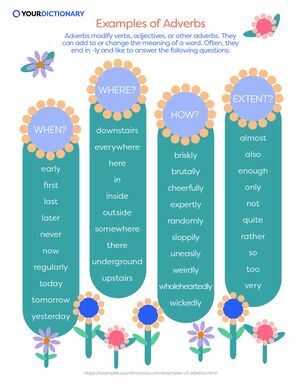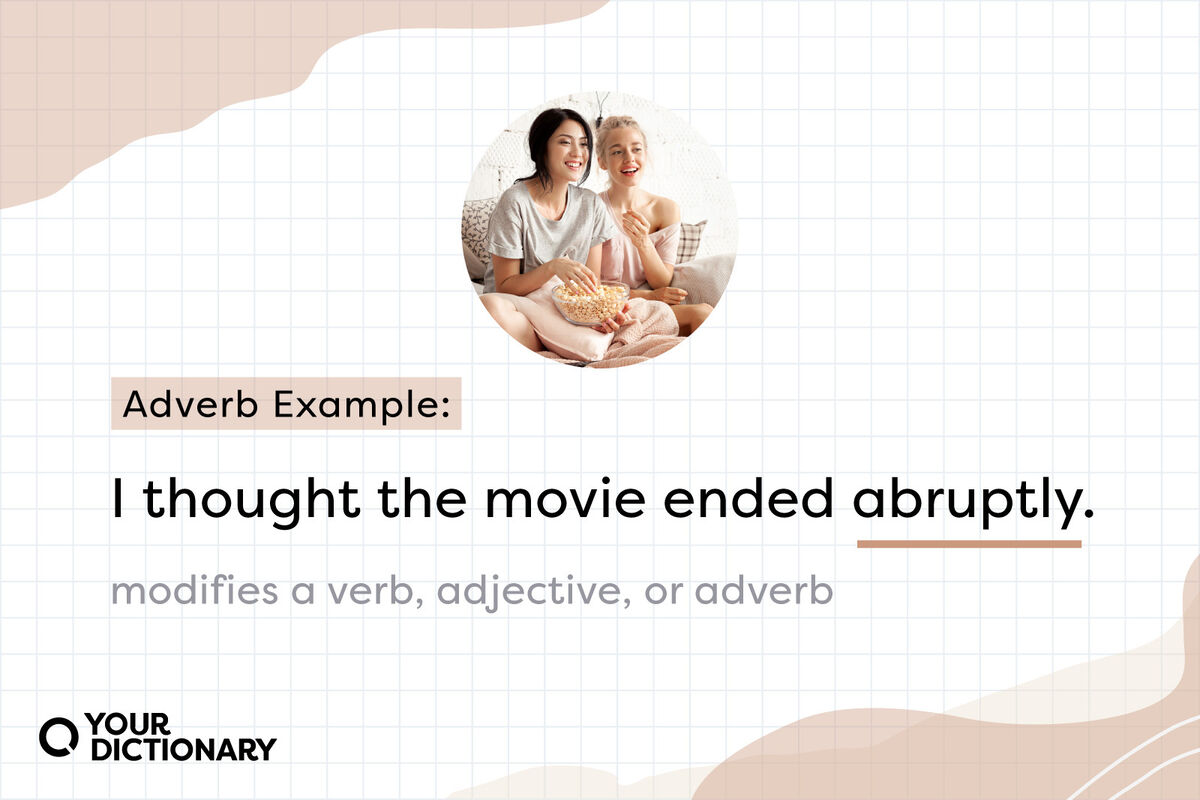

Adverbs can mystify writers because they have a number of different functions within the English language. Reviewing examples of adverbs and adverb phrases can help you identify them and use this part of speech effectively. With a couple adverbs by your side, you can add further description, describe an action, or intensify the meaning of another word.
Spotting an Adverb
Adverbs modify verbs, adjectives, or other adverbs. They can add to or change the meaning of a word. A great way to spot adverbs is to look for words that end in -ly.
Let's take a look at a few examples:
- Abruptly: I thought the movie ended abruptly.
- Beautifully: The beautifully painted landscape is a wonderful addition to my living room decor.
- Delicately: Grandma's crystal vase is a priceless antique that must be handled delicately.
- Delightfully: Her outfit showcased her delightfully quirky personality.
- Firmly: The teacher firmly disciplined the students for their misbehavior.
- Lightly: She lightly dusted the brownies with a layer of powdered sugar before serving.
- Truthfully: She truthfully answered the police officer's questions.
- Quickly: Quickly finish the grocery shopping so we can get to the party in time.
- Wearily: At the end of a long day, she wearily headed to bed.
- Willfully: I sent my son to bed early for willfully refusing to eat his vegetables.
If you're a teacher, our activities with adverbs and lessons about adjectives vs. adverbs can help your students learn to spot adverbs effectively.

Adverbs Tell How It Happened
Adverbs are part of a category of descriptive language because they describe how something was done. For example:
- Briskly: Kristen briskly walked to the library, eager to complete her homework.
- Brutally: It was brutally clear he was not interested in hearing my opinion.
- Cheerfully: April cheerfully greeted Mark each morning.
- Expertly: Adam expertly maneuvered the components of the machine into their proper positions.
- Randomly: I love to randomly share interesting trivia with my friends and family.
- Sloppily: He writes sloppily, but insists his ideas are more important than having perfect penmanship.
- Uneasily: Jemma sighed uneasily, knowing that the dark sky was a sign of the impending storm.
- Weirdly: She dances weirdly, but her quirky personality is what I love the most.
- Wholeheartedly: I wholeheartedly believe education is the key to a better future.
- Wickedly: "I don't think you want to know the whole story," he said wickedly.
Adverbs Tell Where It Happened
Some adverbs describe the location of an action. Examples of adverbs like this would include:
- Downstairs: The public library often holds meetings downstairs.
- Everywhere: Jack looked everywhere for his missing keys.
- Here: She will plant her garden here.
- In: We stayed in to watch a movie instead of attending the party.
- Inside: When it's hot and humid, Anna likes to read inside.
- Outside: The children love to play outside.
- Somewhere: I want to go fishing somewhere warm and sunny.
- There: We went to Minnesota for my cousin's wedding and stayed there for three nights.
- Underground: The gopher began burrowing underground.
- Upstairs: I went upstairs to see my grandma who was on bed rest.
Adverbs Tell When It Happened
Examples of adverbs that describe when an action occurred include:
- Early: She arrived early for the meeting.
- First: When I bake, I make cookies first.
- Last: When I clean, I do laundry last.
- Later: I will stop by later to see how you are doing.
- Never: He never wants to go to the park with me.
- Now: The movie is starting now.
- Regularly: Writing regularly in my journal is soothing.
- Today: I have many things to accomplish today.
- Tomorrow: Tomorrow, we are going to the movies.
- Yesterday: She came over for a visit yesterday.
Adverbs Tell the Extent of the Action
Adverbs also describe the extent to which something was done, including:
- Almost: I almost stopped at McDonald's for lunch, but I was running late.
- Also: A talented singer, Jamie also enjoys playing the saxophone.
- Enough: Daniel is finally tall enough to ride the roller coaster.
- Only: I only take the bus to work on Mondays.
- Not: He is not running that race today.
- Quite: I was quite pleased to see my son's progress in school this year.
- Rather: I am rather tired after spending the day at the beach.
- So: I am so hungry, I could eat a horse.
- Too: It is too loud in here for me to concentrate.
- Very: Baby Emily was very tired after missing her afternoon nap.
Adverbs Are Intensifiers
Another function of adverbs is to intensify the meaning of the word it's modifying. It does this by putting more or less emphasis on the word, amplifying the meaning of the word, or toning down the feeling of the word.
Here are some sentences with the emphasizing adverb in bold:
- He literally wrecked his car.
- I am certain of the facts, for sure.
- You simply don't understand.
- I really don't care what you think.
Sentences that amplify would be like:
- She completely rejected his proposal.
- I heartily endorsed the new restaurant.
- He totally gets me.
- I absolutely refuse to stay here any longer.
Adverbs and adverb phrases that tone down the feeling or mood include:
- You can improve on this to some extent.
- The boss almost quit his job after that.
- I somewhat understand what you are saying.
- She mildly disapproved of his actions.
Adverb Phrases
Adverb phrases function like adverbs, modifying a verb or adjective. They add more information to a sentence, telling us when, how, where, and to what extent. Adverb phrases don't always contain an adverb and can start with a preposition or the infinitive form of a verb.
Here's a list of sentences with the adverb phrase in bold:
- He lived in the north of Germany.
- We went out today to buy a new car.
- She goes to the movies every week.
- She made me laugh wildly and uproariously.
- I stacked the books where the students can reach them.
- She looked for wildflowers yesterday afternoon.
- He moves so slowly in the morning.
- I went to bed much later than usual.
- Please stay as long as possible.
- We cheered loudly and crazily to support the team.
Using Adverbs Effectively
An adverb or adverb phrase is a workhorse in the world of grammar, changing and enhancing the meaning of the accompanying verbs, adjectives, or adverbs. However, adverbs should be used sparingly. When you use multiple adverbs, you risk alienating your reader with dense prose that's too difficult to read.
Review these adverb flashcards for more examples and help with your adverb practice!